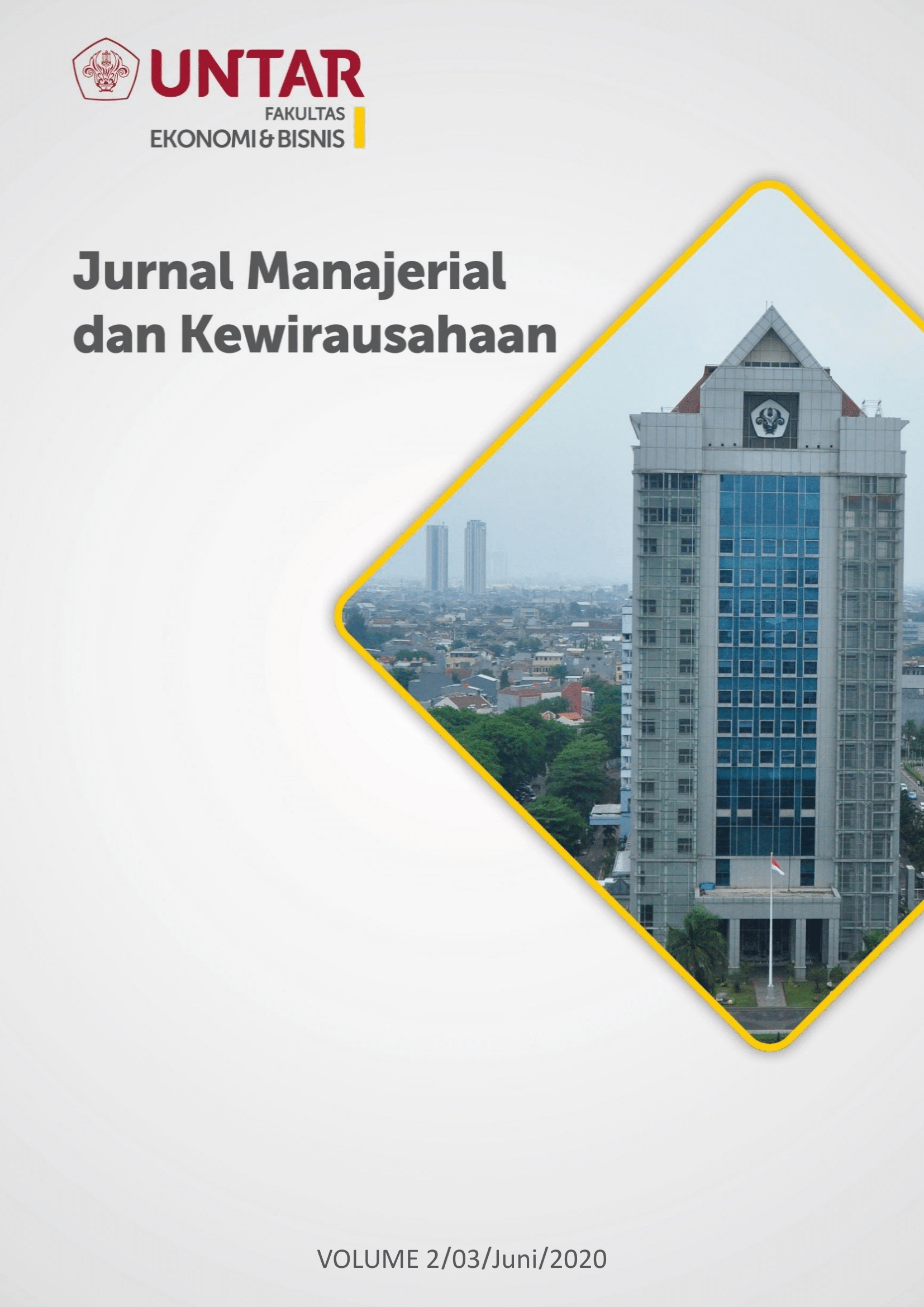Pengaruh Penggunaan Media Sosial dan Orientasi Kewirausahaan terhadap Kinerja UMKM
Main Article Content
Abstract
This research was conducted to study Social Media and Entrepreneurial Orientation on the performance of culinary business performance in Grogol and Mangga Besar, West Jakarta.The research design is causal with a total sample of 40 respondents, the sampling technique uses non-probability sampling method. This Data was processed using the Smart PLS 3.0 program.The results of this study indicate a significant influence between social media and entrepreneurial orientation that uses in culinary business in Grogol and Mangga Besar, West Jakarta.
Penelitian ini bertujuan untuk mengetahui pengaruh dari overconfidence, herding effect, dan self-monitoring terhadap investment decision pada masa pandemi covid-19. Sampel penelitian adalah sebanyak 201 responden yang sudah berpenghasilan dan mengalami masa pandemi covid-19. Metode penelitian ini menggunakan SmartPLS dan dengan cara menyebarkan kuesioner dengan google form. Hasil dari penelitian ini adalah terdapat pengaruh overconfidence, herding effect, dan self-monitoring terhadap investment decision pada masa pandemi covid-19.
Article Details
Section
This work is licensed under a Jurnal Muara Ilmu Ekonomi dan Bisnis Creative Commons Attribution-ShareAlike 4.0 International License.,/p>
References
Bernoff, J. and Li, C. (2008), “Harnessing the power of the oh-so-social web”, MIT Sloan Management Review, Vol. 49 No. 3, pp. 36-42.
Goh, K.-Y., Heng, C.-S. and Lin, Z. (2013), “Social media brand community and consumer behavior: quantifying the relative impact of user-and marketer-generated content”, Information Systems Research, Vol. 24 No. 1, pp. 88-107.
Ghozali, D. G. (2016). Partial Least Squares: Regression & Structural Equation Models. In G. David Garson and Statistical Associates Publishing.
Ghozali, Imam. (2014). Structural Equation Modeling Metode Alternatif dengan Partial Least Square.
Hsu, Y.-L. (2012), “Facebook as international emarketing strategy of Taiwan hotels”, International Journal of Hospitality Management, Vol. 31 No. 1, pp. 972-980.
Keh, H.K., Nguyen, T.T.M. and Ng, H.P. (2007), “The effect of entrepreneurial orientation and marketing information on the performance of SMEs”, Journal of Business Venturing, Vol. 22 No. 4, pp. 592-611.
Kraus, S. (2013). The role of entrepreneurial orientation in service firms: empirical evidence from Austria. The Service Industries Journal, 33(5), 427-444.
Li, C. and Bernoff, J. (2008), Groundswell: Winning in a World Transformed by Social Technologies, 1st ed., Harvard Business School Press, Boston, MA.
Lumpkin, G.T. and Dess, G. (1996), “Clarifying the entrepreneurial orientation construct and linking it to performance”, Academy of Management Review, Vol. 21 No. 1, pp. 135- 172.
Malhotra. (2020). Marketing Research: Applied Insight.
Moullin, M. (2007). Performance measurement definitions: Linking performance measurement and organisational excellence. International journal of health care quality assurance, 20(3), 181-183
Rodriguez, M., Ajjan, H. and Peterson, R.M. (2016), “Social media in large sales forces: an empirical study of the impact of sales process capability and relationship performance”, Journal of Marketing Theory and Practice, Vol. 24 No. 3, pp. 365-379.
Smart, D. T., & Conant, J. S. (1994). Entrepreneurial orientation, distinctive marketing competencies and organizational performance. Journal of applied business research, 10, 28-28.
Sekaran, U. and Bougie, R. (2010), Research Methods for Business: A Skill Building Approach, Wiley, London.
Sugiyono, (2012) Metode Penelitian Pendidikan (Pendekatan Kuantitatif, Kualitatif, dan R&D), Bandung: Alfabeta
Wiklund, J. and Shepherd, D. (2003), “Knowledge base resources, entrepreneurial orientation and the performance of small and medium sized businesses”, Strategic Management Journal, Vol. 24 No. 12, pp. 1307-1314.

